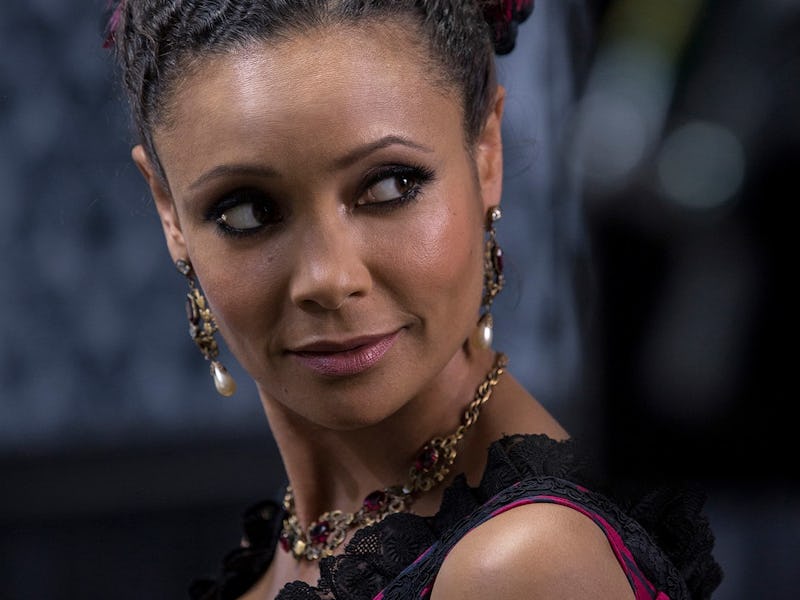Radiohead Is a Perfect Match for Maeve on 'Westworld'
Why the band who made "Paranoid Android" isn't too obvious for an actual paranoid android.

HBO’s robot-cowboy, Old West-A.I. singularity series Westworld is full of big ideas, and also full of fascinating music choices. Besides composer Ramin Djawadi’s hurried score, the show prides itself on conspicuous piano or orchestral versions of not-so-obscure rock hits. The premiere episode treated viewers to a jangly version of “Black Hole Sun” by Soundgarden and a lush interpolation of “Paint It Black” by the Rolling Stones. But the show definitely has an obvious favorite musical anachronism: Radiohead, which fits perfectly with the show’s deadly, paranoid, and self-aware host Maeve.
A version of Thom Yorke and company’s “No Surprises” wafts from the player piano at the park’s Mariposa Saloon in “Chestnut” in a moment where Maeve (Thandie Newton) is describing her backstory to an increasingly beleaguered human guest. Similarly, the Mariposa piano version of “Fake Plastic Trees” kicks off “The Adversary,” showing Maeve going about her day and chatting with another host about their predetermined loops.
The tragedy in Maeve’s words and actions is that it’s all fabricated, a programmed ruse that takes on an even more tragic irony given the song meanings. Yorke pines for a similarly fabricated life without worry, pain, or sadness in “No Surprises,” and could have easily been talking about the false constructed security of a place like Westworld in Fake Plastic Trees.
At worst, the song choices seem a bit too obvious, too easy to plug into scenes to elicit an emotional response because of the band’s reputation for sad songs about the intersection of technology and human emotion. But it’s not as if Westworld co-creator Jonathan Nolan is the only creative talent behind a thought-provoking, zeitgeist-y show currently mining Radiohead’s music for narrative punctuation. Black Mirror creator Charlie Brooker closed the Season 3 episode “Shut Up and Dance,” with “Exit Music (For a Film)” as a way to pepper the episode’s computer hacker twist with a bleak, literal musical accent.
Using Radiohead songs in various projects isnt anything new to Nolan either. His older brother Christopher Nolan wanted Radiohead’s “Paranoid Android” to play over the end credits of his film Memento (which Jonathan scripted), before scrapping it for being too expensive to license, though a version of the ambient Kid A track “Treefingers” is still in there. “Analyze,” a Thom Yorke solo song, was used in the end credits for the Jonathan-scripted and Christopher-directed film The Prestige, while the younger Nolan used “Exit Music (For a Film)” in his series Person of Interest.
But pedantic critiques overlook the most meta and illuminating Radiohead moment in the show so far: In “The Adversary,” a intelligence-enhanced Maeve forces robot repairman Felix Lutz to march her through the robot strewn bowels of the park set to an exuberant rendition of “Motion Picture Soundtrack.”
Viewers have seen and absorbed this mechanical horror many times throughout the series, but none of the hosts themselves have been able to witness the total, seemingly unreal deconstruction of their tidy reality.
We watch the show — which is a scripted, make believe construct — and we see a character also experiencing the same thing. During her consciousness-expanding stroll, Maeve also sees a Westworld trailer of her own “life,” with images from her past identities and narrative loops. The melancholy scene drives home the song title, and Yorke’s idea that he and she could be — as he sings in the actual track — “crazy, maybe.”
For his part, Djawadi explained to Vulture that the show uses Radiohead the songs for pragmatic reasons. “These particular pieces that the piano plays help you with the sense of time, the repeats. It just marks time, and it provides the recognition factor that this is a preprogrammed event,” he said. Nolan essentially agreed, telling EW, “There’s an emotional impact and theres also a weird dark beauty to it.”
Still, for some reason, Westworld’s showrunners have been treating Radiohead’s original versions as off-limits, despite how well they fit with the show’s overarching themes. The same minds who championed Mad Men’s famously expensive use of “Tomorrow Never Knows” by the Beatles at the end of that show’s fifth season episode “Lady Lazarus,” or Breaking Bad’s series-ending use of Badfinger’s “Baby Blue,” are put-off by the idea of a show about paranoid robots using music by a band who once made a song about paranoid robots.
But in Maeve’s case, Radiohead-meets-Westworld is the perfect thematic bond, and the obvious use of their music is a natural inclination that shouldn’t be needlessly complicated.
In “Chestnut,” programming executive Bernard Lowe suggests to the park’s godhead and creator Dr. Robert Ford that sabotage is the reason for the park’s robot problems. “It’s the simplest solution,” he says — invoking the problem-solving principle Occam’s Razor. Ford, an informed skeptic, goes on to say William of Occam was a 13th century monk who can’t help us now. But maybe Thom Yorke of Radiohead can help Maeve find her voice. It’s as simple as that.